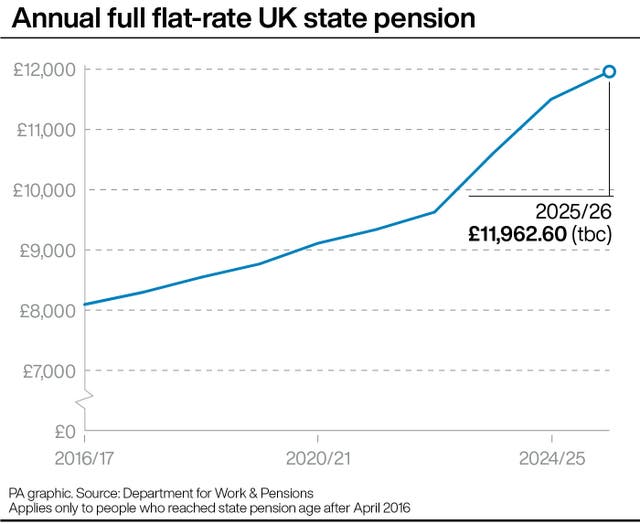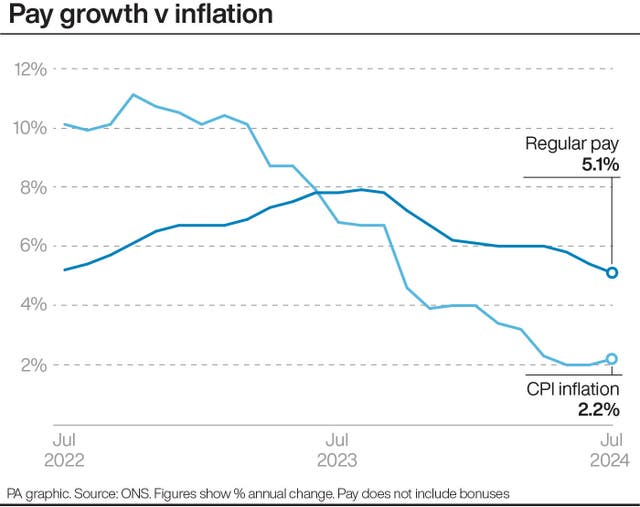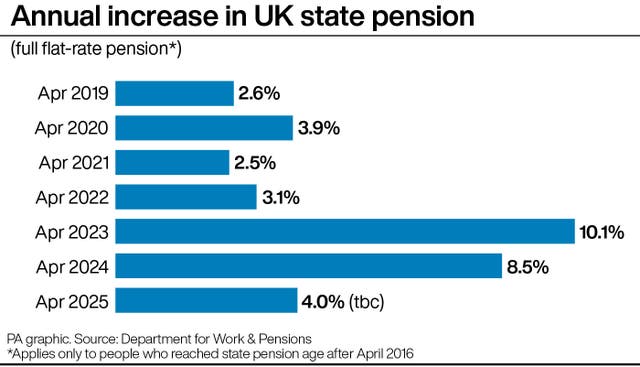
James O'Brien 10am - 1pm
10 September 2024, 12:54

Wage growth figures released on Tuesday suggest some pensioners will see an annual state pension increase of around £460 next year.
Pensioners, many of whom face losing their winter fuel payments, are expected to see their state pension rise next spring in line with recent wage growth.
Here is a look at how much they could get:
– How much is the state pension expected to increase by next April?
Wage figures released by the Office for National Statistics (ONS) on Tuesday suggest the increase will be £460 for people who receive the full new state pension.
The new state pension, for people who reached state pension age after April 2016, should rise from £11,502 to around £11,962 annually from next April.

Someone on the old full basic state pension would see their pension rise from £8,814 to £9,167 per year – an annual increase of around £353.
– Why are these increases expected?
Labour has committed to the triple lock, which means that the state pension increases every April in line with average total earnings growth in the year from May to July of the previous year, CPI (Consumer Prices Index) inflation in September of the previous year, or 2.5% – whichever is highest.
The ONS said total pay increased by 4% in the three months to July.

With inflation running at more subdued levels, the wage figure is expected to be the one that determines the increase this time around.
But the figure is subject to possible revisions in next month’s data and any decision on a pension increase will be made by Work and Pensions Secretary Liz Kendall ahead of October’s Budget.
– So will pensioners feel better off?
Many pensioners do not receive the full state pension and so they will not see the full cash increases. Recent analysis released by Royal London revealed only around half of people receiving the new state pension last year were getting the full weekly amount – and around 150,000 were on less than £100 per week.
– What about winter fuel payments?
The Government has faced criticism over the decision to means test winter fuel payments, worth up to £300.
Chancellor Rachel Reeves announced the plan to limit the winter fuel allowance in July, as she said there was a need to fill a £22 billion “black hole” in the public finances.
Only those who claim pension credit and other means-tested benefits will receive it after the change.
It is expected to reduce the number of pensioners in receipt of the up to £300 payment by 10 million, from 11.4 million to 1.5 million – most of whom claim pension credit – saving around £1.4 billion this year.
As the state pension increase will not be until next April, pensioners who have been stripped of their winter fuel payments will still need to get by this winter.
– Are more people taking up pension credit?
While around 1.4 million pensioners are already receiving pension credit, there are up to an estimated 880,000 households eligible for the support who are yet to claim.
Claims for pension credit doubled in the weeks following the Government’s announcement about restricting winter fuel payments, according to Department for Work and Pensions (DWP) figures.
Some 38,500 pension credit claims were received by the DWP in the five weeks since the winter fuel payment announcement on July 29, compared to 17,900 claims in the five weeks up to the announcement.
This represents a 115% jump in pension credit claims.
– Are there still concerns around people not claiming?
Speaking on ITV’s Good Morning Britain on Tuesday, consumer champion Martin Lewis said of the extra 20,000 people claiming over five weeks: “If they continue to do so over the next couple of months before we get to the winter fuel payment time, that’s maybe an extra 60,000 people.
“That still leaves over 800,000 people who are eligible not claiming.”
Mr Lewis said: “Most people who are going to claim it are claiming it… and that is a real problem.”
He added: “The mechanisms that the Government are putting in place may help a few more claims but there will still be huge numbers who aren’t claiming. And I haven’t yet heard a decent answer about what we’re going to do to help those people.”
Mr Lewis said: “How are we going to stop them having to choose between heating and eating?”

– Could more pensioners end up paying tax?
Helen Morrissey, head of retirement analysis, Hargreaves Lansdown said: “The increase will take the full state pension to just shy of £12,000 next year, closing in on the £12,570 personal allowance.
“Given that the freeze to this threshold is expected to remain in place until 2028, it raises the spectre of the full state pension alone taking pensioners over it and into the realms of paying income tax during the next few years.”
She added: “If pensions are rising with price inflation at the point when the state pension eventually breaches the personal allowance, once tax is taken into account, retirees who get just the state pension will actually be worse off in real terms.
“Pensioners are already asking whether they should be in the frame for filling the gap in the public finances, and this isn’t going to quell their concerns.”
Sir Steve Webb, a partner at consultants LCP (Lane Clark & Peacock), pointed out that many pensioners already pay tax, with around 8.5 million pensioners paying income tax.
He said this will mean that recently-retired pensioners on the full state pension potentially receive an after-tax increase of £368 rather than £460.
– What about the eroding impact of inflation?
Sir Steve, a former pensions minister, said: “Part of next April’s increase is simply to keep pace with rising prices. Based on the current inflation figure of 2.2%, the new state pension would need to rise by just over £250 simply for pensioners to stand still.
“Whilst an above-inflation increase of £460 will be welcomed, only the further £210 represents a real increase. And this is before allowing for the income tax which most pensioners will pay on their state pension rise. Those who lose £200 or £300 in winter fuel payments will therefore still be worse off in real terms next April.”